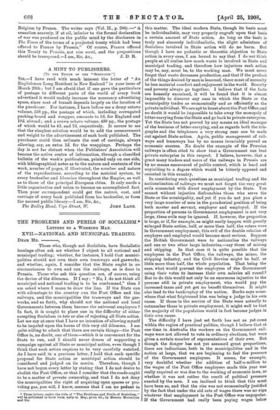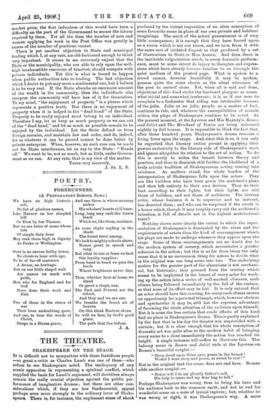THE PROBLEMS AND PERILS OF SOCIALISM.* LETTERS TO A. WORKING
MAN.
XVII.—NATIONAL AND MUNICIPAL TRADING.
DEAR Mn. 9 Those who, though not Socialists, have Socialistic Leanings often ask me whether I object to all national and municipal trading; whether, for instance, I hold that munici- palities should not own their own tramways and gasworks, and whether, again, I consider that the State ought in no circumstances to own and run the railways, as is done in Prussia. Those who ask this question are, of course, using the device of the dilemma. If I say : "No, I do not think all municipal and national trading is to be condemned," then I am asked where I mean to draw the line. If the State can with advantage to the country run the Post Office and the railways, and the municipalities the tramways and the gas- works, and so forth, why should not the national and local Governments between them become the universal employers P In fact, it is sought to place one in the difficulty of either accepting Socialism in toto or else of rejecting all State action. Let me say at once that I have no intention of allowing myself to be impaled upon the horns of this very old dilemma. I am luite willing to admit that there are certain things—the Post Office is, no doubt, one of them—which it is convenient for the State to run, and I should never dream of supporting a campaign against all State or municipal action, even though I think that such action requires to be very carefully watched. As I have said in a previous letter, I hold that each specific proposal for State action or municipal action should be considered and judged on its merits. Therefore, though I have not begun every letter by stating that I do not desire to abolish the Post Office, or that I consider that the roads ought to be a matter of private ownership, and that I do not deny the municipalities the right of acquiring open spaces or pro- viding gas, you will, I know, assume that I um no pedant in
• These letters, under the title of "The Problems and Perils of Socialism," will be published in book form early in May, price 6d., by Messrs. Macmillan sad Co.
this matter. The ideal modern State, though its basis must be individualistic, may very properly engraft upon that basis a certain amount of State action. As long as the basis is truly and sincerely individualistic, the slight admixture of Socialism involved in State action will do no harm. But though I have no pedantic or theoretic objection to State action in every case, I am bound to say that I do not think people at all realise how much waste is involved in State and municipal trading, and therefore how injurious such action may be, nay, must be, to the working man. We must never forget that waste decreases production, and that if the product of the things desired by man is lessened, there must of necessity be less material comfort and enjoyment in the world. Scarcity and poverty always go together. I believe that if the facts are honestly examined, it will be found that it is almost impossible to discover any case in which the State or the municipality trades as economically and as efficiently as the private individual. We are apt to boast about the Post Office, and no doubt it would be impossible to take away the monopoly of letter-carrying from the State and go back to private enterprise. Yet the State has not proved by any means an ideal manager of the business of letter-carrying, and as regards both the tele- graphs and the telephones a very strong case can be made out against State action. Again, public management of rail- ways and tramways has by no means invariably proved an economic success. No doubt the example of the Prussian railways is often cited to show that a Government can beat private enterprise in this respect. I believe, however, that a great many traders and users of the railways in Prussia are by no means enamoured of public control, which is hard and unyielding to a degree which would be bitterly opposed and resented in this country.
In considering such questions as municipal trading and the nationalisation of railways we must not forget the very great evils connected with direct employment by the State. You cannot without injustice disfranchise those who serve the State or the municipality, and yet if you do not you place a very large number of men in the paradoxical position of being both master and servant, employer and employed. If the proportion of persons in Government employment is not very large, these evils may be ignored. If, however, the proportion is large, or if, for example, as might easily happen with greatly enlarged State action, half, or more than half, the voters were in Government employment, this evil of the double relation of employer and employed would become most serious. Suppose the British Government were to nationalise the railways and one or two other large industries,—say those of mining and shipping. In that case it is quite possible that the employees in the Post Office, the railways, the mines, the shipping industry, and the Civil Service might be half, or little more than half, the whole population. That being the case, what would prevent the employees of the Government using their votes to increase their own salaries all round ? But to do this would not only be an enormous injustice to the persons still in private employment, who would pay the increased taxes and yet get no benefit themselves. It might also lead to the bankruptcy of the nation. Burke says some- where that what frightened him was being a judge in his own cause. If those in the service of the State were actually to outnumber those in private employment, it might well be that the majority of the population would in fact become judges in their own cause.
The difficulty I have just set forth has not as yet come within the region of practical politics, though I believe that at one time in Australia the workers on the Government rail- ways were not allowed to vote in ordinary elections, but were given a certain number of representatives of their own. But though the danger has not yet assumed great proportions, there are indications, both in the municipalities and in the nation at large, that we are beginning to feel the pressure of the Government employees. It seems, for example, very, doubtful whether the addition of half-a-million to the wages of the Post Office employees made this year was really required or was due to the working of economic laws, or whether it was not rather the result of political pressure exerted by the men. I am inclined to think that this must have been so, and that the rise was not economically justified by the fact that under the old rate of wages there was no sign whatever that employment in the Post Office was unpopular. If the Government had really been paying wages below
market price, the first indication of this would have been a difficulty on the part of the Government to secure the labour required by them. Yet all the time the number of men and women applying for work in the Post Office was greatly in excess of the number of positions vacant.
There is yet another objection to State and municipal trading which I, at any rate, am old-fashioned enough to think very important. It seems to me extremely unjust that the State or the municipality, who are able to rely upon the well- nigh inexhaustible resources of taxation, should compete with private individuals. Yet this is what is bound to happen when public authorities take to trading. The last objection which I desire to put may seem a sentimental one, but I believe it to be very real. If the State absorbs an enormous amount of the wealth in the community, then the individuals who compose the community will have less of it for themselves. To my mind, "the enjoyment of property" is a phrase which represents a positive truth. But there is no enjoyment of property when it is lodged in the "dead hand" of the State. Property to be really enjoyed must belong to an individual. Therefore I say, let us keep as much property as we can out of the "dead hand," and let as much as possible remain to be enjoyed by the individual Let the State defend us from foreign enemies, and maintain law and order, and do, indeed, for us whatever it can be proved cannot be done better by private enterprise. When, however, no such case can be made out for State interference, let us say to the State : "Hands off." We want to be, not as much, but as little, under Govern- ment as we can. At any rate, that is my view of the matter.
Yours very sincerely, j. Si. L. S.























































 Previous page
Previous page